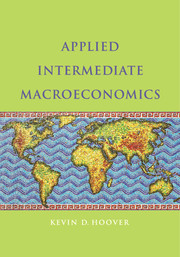Book contents
- Frontmatter
- Brief Contents
- Contents
- Acknowledgments
- To the Student
- To the Teacher
- Part I Introduction
- Part II The National Accounts
- Part III Trends and Cycles
- Part IV Financial Markets
- Part V Aggregate Supply
- Part VI Aggregate Demand
- Part VII Macroeconomic Dynamics
- Part VIII Macroeconomic Policy
- 16 Monetary Policy
- 17 Fiscal Policy
- Part IX Macroeconomic Data
- Symbols
- Glossary
- Guide to Online Resources
- Index
- References
17 - Fiscal Policy
from Part VIII - Macroeconomic Policy
Published online by Cambridge University Press: 05 June 2012
- Frontmatter
- Brief Contents
- Contents
- Acknowledgments
- To the Student
- To the Teacher
- Part I Introduction
- Part II The National Accounts
- Part III Trends and Cycles
- Part IV Financial Markets
- Part V Aggregate Supply
- Part VI Aggregate Demand
- Part VII Macroeconomic Dynamics
- Part VIII Macroeconomic Policy
- 16 Monetary Policy
- 17 Fiscal Policy
- Part IX Macroeconomic Data
- Symbols
- Glossary
- Guide to Online Resources
- Index
- References
Summary
How much should the government spend? How should it pay for it? Are higher taxes needed to balance the budget or will they merely stifle economic growth? Do deficits raise interest rates? Is the debt a burden to future generations? These and related questions concern fiscal policy. Directly or indirectly they are the main topics of political economic debate. In Chapter 13, we explored the role of fiscal policy in the determination of aggregate demand. In this chapter, we go into greater depth to investigate fiscal policy in the long and short runs.
In the United States, monetary policy is relatively independent of politics. The Federal Reserve was created by Congress, and Fed chairmen testify regularly before congressional committees about the state of monetary policy. Nevertheless, the Federal Reserve has been structured to be free of day-to-day political control. Central banks are not independent in every country, but the idea that they should be independent has steadily gained support throughout the world over the past quarter century.
In contrast, fiscal policy is the warp and woof of politics. The word “fiscal” is derived from the Latin word fisc meaning the emperor's privy purse or the public treasury. More political heat is generated on questions about filling or depleting the purse – on getting and spending – than on any other question.
- Type
- Chapter
- Information
- Applied Intermediate Macroeconomics , pp. 685 - 724Publisher: Cambridge University PressPrint publication year: 2011



